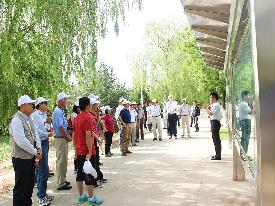
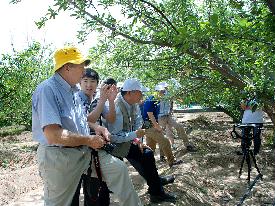
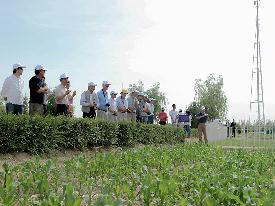

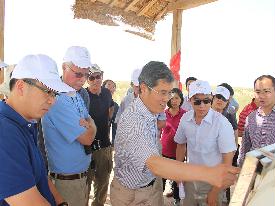
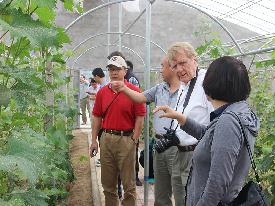
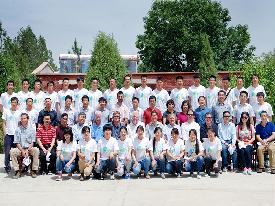

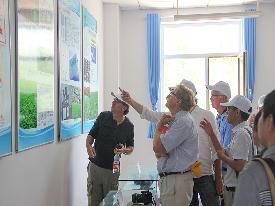
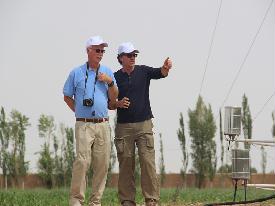
From June 3 to June 5, scholars and experts from USA, UK, France, Australia, and Israel, accompanied by Academician and director of the Shiyanghe Experimental Station of CAU Kang Shaozhong, active deputy director of the station Du Taisheng, deputy director of the Station Wang Fengxin and Huo Zailin, and other professors of CAU visited the Shiyang River Basin, located at the Hexi Corridor of Gansu Province to learn the present status of agriculture, ecosystem, and high-efficient water use applications in the region. Earlier from June 1 to June 2, they attended the workshop and launch meeting of the Innovation and Talents Introduction Base of ‘Improving Water Use Efficiency in Agriculture’ (‘111’ Plan).
The first stop of the visit was the Shiyanghe Experiment Station. Prof. Du welcomed the guests and introduced them the station’s history, goals, research interests, researchers, equipment and instruments, as well as research progresses the station has achieved, technical training and demonstration the station has carried out. Then oversea experts toured the on-going field experiments, instruments, and laboratories of the station. The field experiments the experts toured included water-heat-gas dynamics for under-mulch drip irrigated potato, seed corn under-mulch drip irrigation planting module, effect of saline water irrigation on soil physical properties, water-salt-nutrient coupling effects for seed corn, water consumption, yield and quality of alfafa under sprinkler and subsurface drip irrigation, seed corn planting density optimization, effects of different water-fertilizer treatments on water use efficiency and fruit quality of tomato under alternate-root irrigation, micro-irrigation, and subsurface drip irrigation, surface irrigation technological parameters optimization, water use efficiency distribution of seed corn, water flow dynamics and tree growth simulation in an apple orchard; instruments they toured included large weighting lysimeter, eddy covariance system, Bowen-ratio and energy balance observation system, 24-m high flux monitoring tower, evaporation and precipitation observation system, sap flow gauge, and plant growth monitoring system; laboratories were soil chemistry, soil water, fruit quality, isotope and chromatograph analysis, and crop physiology.
The oversea experts group then visited Laohukou demonstration area for preventing and controlling sand, Hongshaliang demonstration area for high-efficient water-saving irrigation, Qingtu Lake ecosystem restoration area, and Taozhong demonstration park for modern agriculture to gain knowledge of agriculture, ecosystem and water-saving irrigation practices in the desert oasis of Minqin county, located at the low reaches of Shiyang River. At Laohukou, the experts came to know over 10 practical approaches for sand controlling and afforestation such as nylon nets, plastic bags, cotton stalk, corn stalk, wheat straw, cobblestones, and clay; at Hongshaliang, they showed great interests in various water-saving irrigation technologies and discussed in great details with CAU professors, as well as local technicians; at Qingtu Lake, they experienced the improvements of local ecosystem after implementing the integrative management plan over the entire Shiyang River Basin; At Taozhong, the group witnessed solar greenhouses of different types with local characteristics, and asked questions related to vegetables and fruits grown in the greenhouses, irrigation methods, technicians and equipment, yield, and etc. The last stop of the tour was Hongyashan Reservoir, which is the largest desert reservoir of Asia, bright pearl in the deep desert, and Minqin residents’ lifeline.
The oversea experts shared their thoughts on the Shiyanghe Experiment Station during and after the tour. They considered the station is a very good platform for training, research, and extension and they were very impressed by excellent research conditions the station provided, as well as the on-going projects conducted at the station. The experts spoke highly of the two principles the station has been following, i.e. combination of scientific research, demonstration and extension, and combination of theoretical research and field experiments, and they also expressed their desire and ideas to jointly conduct research experiment, and strengthen international cooperation with CAU in the future. For example, assistant professor Kelly Caylor from Princeton University wrote ‘I greatly enjoyed all aspects of my visit. In particular, the visit to Shiyanghe station was a true delight and I am extremely excited about all the opportunities to work together there on issues related to plant water use and methods for monitoring crop water use and evaporation to maximize water use efficiency in agriculture’ after his return to USA. He also expressed his willingness to work at the station for some time during the next June, and to invite and financially support CAU professors to attend a workshop named ‘Global collaborative network for coupling hydrological forecasts and food security in Sub-Saharan Africa and China’ held at Princeton University in August. Paul Cambre, one of graduate students of Prof. Bill Davies from Lancaster University, has started working at the station, and he planned to stay at the station for three months this year, and five months in the next year. The experts agreed upon that this visit would lay a good foundation for further cooperation between oversea experts and CAU professors.
The oversea experts joining the tour are Prof. Edward Barlow from the University of Melbourne of Australia (Fellow of the Australian Academy of Technological Sciences), Research Scientist Lu Zhang from CSIRO of Australia, Prof. William Davies from Lancaster University of UK, Freddie Lamm from Kansas State University of USA, Prof. Henry Lin from Pennsylvania State University of USA, Prof. Robert Sharp of the University of Missouri of USA, Research Engineer Ruixiu Sui from USDA-ARS, Prof. Laosheng Wu from UC-Riverside of USA, Prof. Hongbing Zhan from Texas A&M University of USA, assistant professor Kelly Caylor from Princeton University of USA, Researcher Gilles Vercambre from INRA of France, and Researcher Alon Ben-Gal from ARO of Israel.